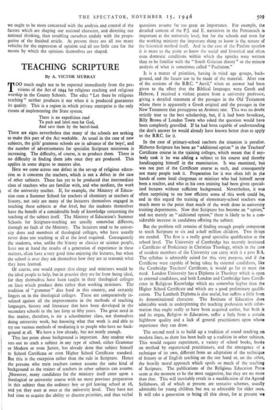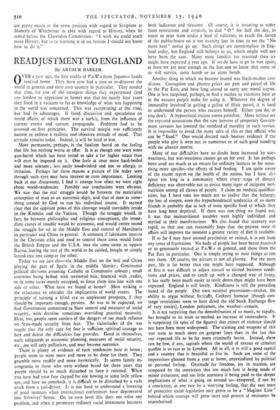TEACHING SCRIPTURE
By A. VICTOR MURRAY
T00 much ought not to be expected immediately from the pro- visions of the Act of 1944 for religious teaching and religious worship in the County Schools. The edict "Let there be religious teaching " neither produces it nor when it is produced guarantees its quality. This is a region in which private enterprise is the only means of implementing the State system.
There is no expeditious road To pack and label men for God, And save them by the barrel-load.
There are signs nevertheless that many of the schools are seeking to make this part of the Act workable. As usual in the case of new subjects, the girls' grammar schools are in advance of the boys', and the number of advertisements for specialist Scripture mistresses is increasing. The difficulty, of course, is to produce them. There is no difficulty in finding them jobs once they are produced. This applies in some degree to masters also.
Here we come across one defect in the set-up of religious educa- tion as it concerns the teachers, which is not a defect in the case of other subjects. There has yet to be produced that intermediate class of teachers who are familiar with, and who mediate, the work of the university teacher. If, for example, the Ministry of Educa- tion runs a Summer School for teachers of chemistry or teachers of history, not only are many of the lecturers themselves engaged in teaching these subjects at that level, but the students themselves have the benefit of a considerable body of knowledge concerning the teaching of the subject itself. The Ministry of Education's Summer Schools for Scripture-teaching are usually somewhat different, through no fault of the Ministry. The lecturers tend to be univer- sity dons and members of theological colleges, who have usually never done any teaching at all at the level required. Consequently the students, who, unlike the history or classics or science people, have not at hand the results of a generation of experience in these matters, often have a very good time enjoying the lectures, but when the school is over they ask themselves how they are to transmit what they have learned.
Of course, one would expect that clergy and ministers would be the ideal people to help, but in practice they are far from being ideal, for they themselves have been taught in their theological colleges on lines which produce dons rather than working ministers. The tradition of "grammar" dies hard in this country, and certainly lingers on in the theological colleges. These are comparatively in- sulated against all the improvements in the methods of teaching languages, history and literature that have been developed in the secondary schools in the last forty or fifty years. The great need in this matter, therefore, is for a schoolmaster class, not themselves doing university work, but knowing what that work is and able to try out various methods of mediating it to people who have no back- ground at all. We have a few already, but not nearly enough.
This last point about background is important. Any student who sets out to teach a subject in any type of school, either Grammar or Modern or even Junior, has already done that subject himself to School Certificate or even Higher School Certificate standard. But this is the exception rather than the rule in Scripture. Hence the persons who train teachers cannot assume the same kind of background as the trainer of teachers in other subjects can assume. Moreover, many candidates for the ministry itself enter upon a theological or university course with no more previous preparation in this subject than the ordinary boy or girl leaving school at 18, and yet they start at once at the university level. They have not had time to acquire the ability to discern priorities, and thus verbal
questions assume far too great an importance. For example, the detailed content of the P.J. and E. narratives in the Pentateuch is important at the university level, but for the schools and even for the working ministry the important thing to know is the nature of the historical method itself. And in the case of the Pauline epistles it is more to the point to know the social and historical and often even domestic conditions within which the epistles were written than to be familiar with the " South Galatian theory " or the minute analysis of what is sometimes called "Paulinism."
It is a matter of priorities, having in mind age groups, back- ground, and the future use to be made of the material. After one of the sessions of the B.B.C. "Anvil," when an answer had been given to the effect that the Biblical languages were Greek and Hebrew, I received a violent protest from a university professor, giving a detailed statement of the passages in the Old Testament where there is apparently a Greek original and the passages in the New Testament that presuppose an Aramaic one. This was no doubt strictly true to the best scholarship, but, if it had been broadcast, Billy Brown of London Town who asked the question would have been completely gravelled. If he had been capable of understanding the don's answer he would already have known better than to apply to the B.B.C. for it.
In the case of primary-school teachers the situation is peculiar. Hitherto Scripture has been an " additional option" in the Teachers' Certificate course in the gaining colleges, which meant that if any- body took it he was adding a subject to his course and thereby handicapping himself in the examination. It was examined, but was not part of the Certificate course as such, and consequently not many people took it. Preparation for it was often left in the hands of some local clergyman or minister who had himself never been a teacher, and who in his own training had been given special- ised lectures without sufficient background. Nevertheless, it was often surprising to see how efficient some of this work could be, and in this regard the training of elementary-school teachers was much more to the point than much of the work done in university training departments. Now that Scripture has become an "option," and not merely an "additional option," there is likely to be a con- siderable increase in candidates offering the subject.
But the problem still remains of finding enough people competent to teach Scripture to six and a-half million children. Two things are needed. The first is a really good specialist qualification at the school level. The University of Cambridge has recently instituted a Certificate of Proficiency in Christian Theology, which in the case of resident members of the University can carry with it a pass B.A. The syllabus is admirably suited for this very purpose, and if the Certificate were capable of being taken by external candidates, like the Cambridge Teachers' Certificate, it would go far to meet the need. London University has a Diploma in Theology which is open to external candidates, and both London and Cambridge have Certifi- cates in Religious Knowledge which are somewhat higher than the Higher School Certificate and which are a good preliminary qualifi- cation. The Lambeth Diploma is also useful, but suffers a little from its denominational character. The Institute of Education does admirable work in underpinning the teaching profession with infor- mation that ought really to have been acquired earlier, but both it and its organ, Religion in Education, suffer a little from a certain highbrow quality and a lack of general practitioners upon whose experience they can draw.
The second need is to build up a tradition of sound teaching on modern lines, as there has been built up a tradition in other subjects. This would require experiment, a variety of school books, books on method by experienced practitioners, and the emergence of a technique of its own, different from an adaptation of the technique of history or of English teaching on the one hand or, on the other, the heavily moral approach which spoils so much of the teaching of Scripture. The publications of the Religious Education Press seem at the moment to be the most suggestive, but they are no more than that. This will inevitably result in a modification of the Agreed Syllabuses, all of which at present are tentative schemes, usually admirable for young children but not so admirable for older ones. It will take a generation to bring all this about, for at present we
are pretty much in the same position with regard to Scripture as Moberly of Winchester in 1861 with regard to History, when he stated before the Clarendon Commission: " I wish we could teach more History, but t.s to teaching it in set lessons I should not know how to do it."



































 Previous page
Previous page